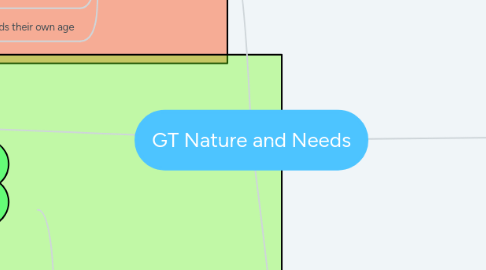
1. GT Myths
1.1. They are socially awkward
1.2. They don't need help
1.3. They will always be successful no matter what
1.4. All/no students are gifted
1.5. Ap/honors classes are enough
1.6. Should be with kids their own age
2. Concepts of Giftedness
2.1. Cheetah reference: different situations produce different signs of giftedess/may be delayed
2.1.1. They need an environment to grow and shine
2.1.2. If not challenged, they may not display signs of giftedness
2.2. Gagne
2.2.1. All talents are developed from natural abilities through learning and influenced by certain catalysts
2.3. Renzulli
2.3.1. Gifted behavior occurs in certain people, at certain times, under certain circumstances
2.3.1.1. Above average ability, creativity, task commitment
2.4. Duke TIP
2.4.1. A summer learning program for academically gifted students in grades 4-12
2.5. IQ cutoff usually at 130
3. Subpopulations
3.1. Low income/Minority
3.1.1. Disorganized
3.1.2. Laugh at inappropriate times
3.1.3. Struggle with reasoning
3.1.4. Will work if they like you
3.1.5. Need more space
3.1.6. Talks back or be rude
3.1.7. Creative
3.1.8. Speaks freely
3.1.9. Independent/dislikes authority
3.1.10. Great storytellers
3.1.11. HArd time getting to work/getting started
3.1.12. Unique sense of humor
3.2. 2E - Disabled
3.2.1. Strengths
3.2.1.1. Wide range of interests that aren't school related
3.2.1.2. Special talent or skill in one thing
3.2.1.3. Interested in big picture, not details
3.2.1.4. Curious
3.2.1.5. High problem solving skills
3.2.1.6. Creative
3.2.1.7. Good vocabulary
3.2.1.8. High energy
3.2.2. Challenges
3.2.2.1. Deficient or uneven academic skills
3.2.2.2. Auditory or visual processing problems
3.2.2.3. Unorganized
3.2.2.4. Memory issues
3.2.2.5. Easily frustrated
3.2.2.6. Difficulty explaining or expressing ideas
3.2.2.7. Difficulty following directions
3.3. Limited English Proficiency
3.3.1. Acquires second language easily and rapidly
3.3.2. High ability in math
3.3.3. Mature sense of culture and languages
3.3.4. Code switches easily
3.3.5. Translates at an advanced lavel
3.3.6. Creative and a leader
4. GT Characteristics
4.1. Intellectual Traits
4.1.1. Large vocabulary and sentence structure for age
4.1.2. Excellent memory
4.1.3. Early reading ability
4.1.4. Unusual sense of humor
4.1.5. Quick learner, quick mastery
4.1.6. Curious, always asking questions
4.1.7. Creative, likes to experiment with different things and ways of doing things
4.1.8. Longer attention span
4.1.9. Thinking is abstract, complex, logical, insightful
4.2. Perfectionism
4.2.1. Focus on positive self talk, set realistic expectation, focus on process not product
4.3. Emotional Traits
4.3.1. High activity level
4.3.2. Asynchronous development
4.3.2.1. Defining characteristic
4.3.2.2. Develop unevenly across skill levels
4.3.3. Heightened sensitivity to interpersonal relationships
4.3.4. Challenge authority figures (teacher, parents)
4.3.5. Deep and intense feelings and reactions
4.3.6. Feeling different and alone
4.3.7. Overestimate abilites
4.3.8. Idealism
4.3.9. Desire to organize through complex schemas
4.3.10. Vivid imagination
4.3.11. Lack of self awareness
4.4. Overexcitabilities (OE's) (Super sensitivities)
4.4.1. Psychomotor
4.4.1.1. Allow time for physical or verbal activiy
4.4.2. Sensual (senses)
4.4.2.1. Create an enviornment that limits offensive stimuli and provides comfort
4.4.2.2. Give attention as much as possible
4.4.3. Emotional
4.4.3.1. Teach them to anticipate physical and emotional responses
4.4.3.2. Accept all feelings
4.4.4. Intellectual
4.4.4.1. Show how to find the answers
4.4.5. Imaginational
4.4.5.1. Let them use their abilities to create
4.5. Underachievment
4.5.1. Lack of interest
4.5.2. Low teacher expectations
4.5.3. Peer pressure
4.5.4. Undiagnosed LD

